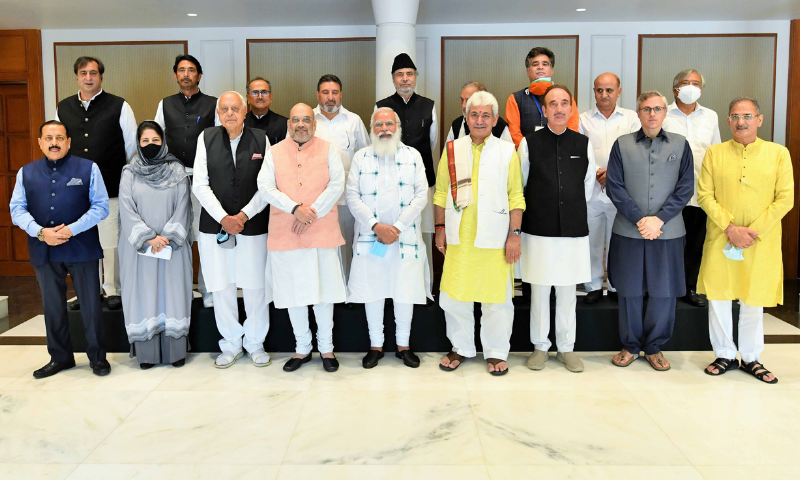NEARLY two years after he scrapped the special constitutional status of held Kashmir and effectively locked down the disputed region, Indian Prime Minister Narendra Modi called a ‘surprise’ meeting of Kashmiri leaders — mostly loyalists — at his New Delhi residence on Thursday. In attendance were some former chief ministers of the occupied region, including Omar Abdullah and Mehbooba Mufti, who were both held in detention after the events of August 2019.
Though it is not exactly clear what prompted India to call this meeting, it would not be wrong to say that the moot, weak on substance as it was, was a signal from the Indian leadership that the hard-line approach to resolving the Kashmir issue, specifically by illegally absorbing the region within India, has failed. Such outreach to held Kashmir’s political class should have been conducted much earlier, while not inviting leaders of the All Parties Hurriyat Conference was ill-advised, as the Hurriyat is one of the major stakeholders in Kashmir.
The signals from the meeting seem to be mixed. While Mr Modi has indicated he is ready to listen to pro-India parties in Kashmir, he has given no timeframe for the restoration of the region’s autonomous status. Ms Mufti had raised the issue of the restoration of Article 370 in the moot, though Mr Modi said a return to full ‘statehood’ would come “at the right time”.
As Foreign Minister Shah Mahmood Qureshi told a press conference in Islamabad on Friday: “This is very vague. What is an opportune time?”
Read: Kashmir question
The fact is that India’s illegal move to annex Kashmir has not only been denounced by the majority of those seeking freedom in the region, but even some of New Delhi’s most staunch loyalists, who were present at the conclave, have rejected this arbitrary decision. Therefore, if the Indian leadership is serious about restoring normalcy in Kashmir, it must set specific goals instead of giving the region’s people lollipops.
If India seeks a genuine way forward, it should set a timeline for a return to autonomous rule in Kashmir. Furthermore, New Delhi must engage with Pakistan as well as the Hurriyat leadership, as the Kashmir issue cannot be resolved without the involvement of all stakeholders. If Mr Modi and company think cosmetic measures and false promises will pacify the Kashmiris, they are mistaken.
Prime Minister Imran Khan has also said that Pakistan is ready for talks with India should the latter provide a roadmap for restoration of Kashmir’s special status. Therefore, India must take solid steps to not only address Kashmiris’ concerns, but also to push the peace process with Pakistan forward. Moreover, India needs to halt its efforts to change Kashmir’s demographics by settling outsiders in the region. India must show that it respects the wishes of the people of Kashmir, or else such meetings will be little more than a political pantomime.
Published in Dawn, June 26th, 2021












































